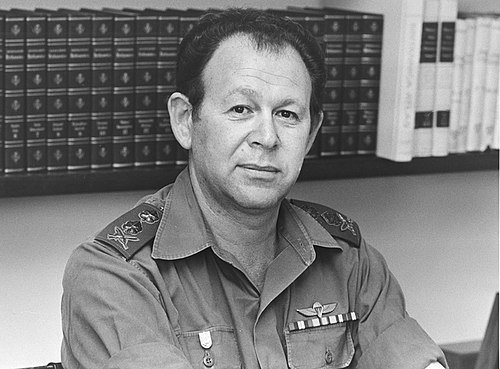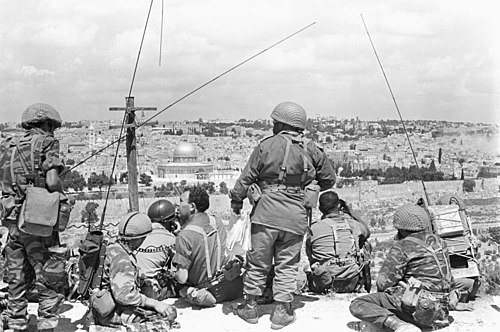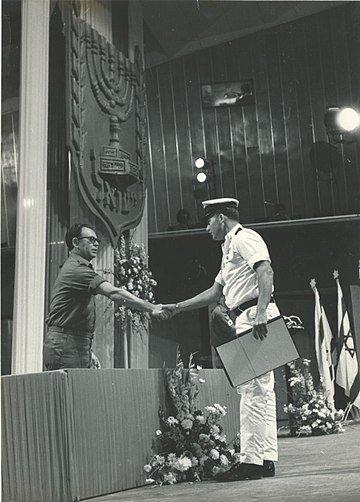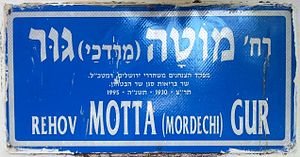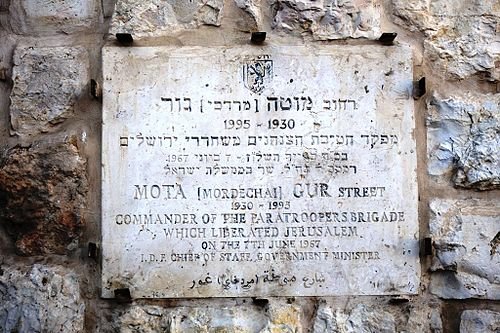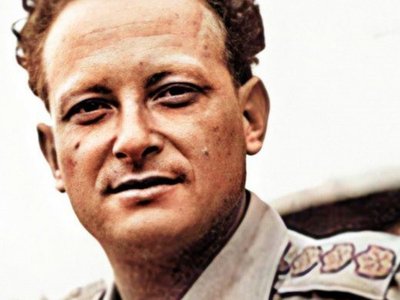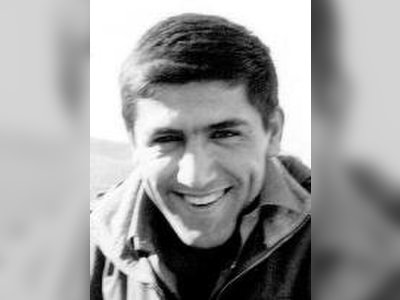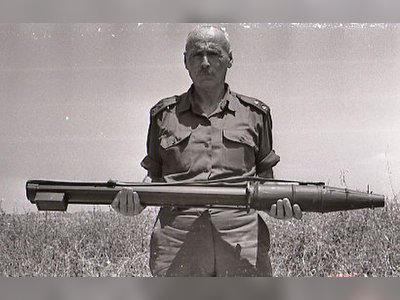Mordechai Gur: A Profile of an Israeli Military and Political Figure
Mordechai "Motta" Gur (Gurben) was born on May 6, 1930, and passed away on July 16, 1995. He was an Israeli military officer, politician, and author who served as the 10th Chief of the General Staff of the Israel Defense Forces (IDF) from 1974 to 1978. Additionally, he was a member of the Knesset and held ministerial positions in the Israeli government representing the Labor Party.
Early Life
Mordechai Gur was born in Jerusalem to parents Moshe and Tova Gurben. He received his education at a high school in Rehovot. At the age of 13, he joined the ranks of the Haganah, where he undertook various roles, including commanding the Gadna youth brigade.
Military Career
Gur volunteered for the Palmach, a special unit within the Haganah, and received training as a fighter and later as a platoon commander. He fought in the War of Independence, initially as the commander of a jeep unit in the Sixth Mechanized Brigade, and was later appointed as the commander of a company in the same brigade. In the years following the war, he served in the regular IDF.
While continuing his military service, Gur pursued studies in humanities and the Middle East at the Hebrew University of Jerusalem. He volunteered for the Paratroopers Brigade and served as a platoon commander under the command of Ariel Sharon.
He led his unit in operations such as Operation Black Arrow and the Retribution Operation in Khan Yunis in 1955, during which he was injured and later received a commendation from Chief of Staff Moshe Dayan, which was later upgraded to a Medal of Valor.
He was then appointed as the commander of the Paratroopers' Unit and participated in Operation Samson and later in Operation Kadesh, where he fought in the Battle of Mitla Pass and parachuted into the head of the column during Operation Ad Tachan.
In 1957, he was appointed as the deputy commander of the Paratroopers Brigade. After a year, he went to study at the École Militaire in Paris. Upon his return to Israel, he served for several months as an instructor at the Armored Corps School and then took command of the Golani Brigade in December 1960. During this time, he oversaw retaliatory actions against terrorist attacks originating from the Gaza Strip.
Following his tenure as the head of the Operations Division in the IDF General Staff, Gur was appointed as the commander of the 55th Paratroopers Brigade, a reserve unit (1966), which he led during the Six-Day War. The brigade, originally intended for battles in the Sinai Peninsula, was redirected to Jerusalem due to a series of intense battles, including those at the Police Academy and Ammunition Hill, ultimately capturing East Jerusalem and the Western Wall. Six years before the actual breakthrough into the Old City, Gur had famously told Rabbi Shlomo Goren that he would be the first to enter the city, a moment etched in the collective memory of Israel during the Six-Day War.
After the war, Gur traveled to the United Nations headquarters and participated in Israel's diplomatic efforts. Upon his return, he received the rank of lieutenant colonel and took command of IDF forces in the Gaza Strip and northern Sinai. Gur later became the commander of the Central Command in December 1969.
During his first tenure as commander, the IDF faced incursions by terrorists from Lebanon and Syria, as well as Syrian military activity. The IDF responded by launching operations in Syria and capturing Mount Dov. Some of the notable operations he led included Operation Kalchata 2 and Operation Argaz, and he was known for his role in the Litani Operation.
Two days before the visit of Egyptian President Sadat to Israel, Gur warned Prime Minister Menachem Begin about Sadat's aggressive intentions. Following this warning, Gur received a public reprimand from Defense Minister Ezer Weizman.
Years after his death, there was criticism of Gur's conduct during the Six-Day War and afterward, both from his soldiers and from soldiers of other units who fought in the Jerusalem area. Specifically, it was claimed that his insistence on capturing the Old City was motivated more by considerations of prestige than military necessity, and that after the war, he made efforts to enhance his role in the capture of the city at the expense of others.
Political Career
After retiring from the IDF following four years as Chief of the General Staff, Gur turned to civilian life. In 1979, he studied business administration at Harvard University and, upon his return to Israel, served as the CEO of Koor Industries until 1984.
Gur's most notable public statement came during the 1988 election campaign for the 11th Knesset. Frustrated by interruptions from supporters of the Likud party during his speech, he famously declared, "We will knock you down, just as we knocked down the Arabs. Just as their shouts didn't help them, your shouts won't help you, and we will knock you down."
In 1981, Gur was elected to the 10th Knesset as a member of the Alignment (a precursor to the Labor Party) and served until his death in 1995. Concurrently, he held multiple roles, as allowed by law, including Chairman of the Board of Directors of Koor Industries. He was also a member of the Foreign Affairs and Defense Committee. In February 1982, during the preparations for Operation Peace for Galilee, he criticized the unnecessary nature of the military operation.
After the 1984 general elections, Gur chose not to join the government led by Prime Minister Yitzhak Shamir, criticizing the government's handling of the 300 Bus Line affair. He also criticized the economic policy of Finance Minister Moshe Nissim, suggesting it was overly liberal. Nevertheless, he continued to serve as a Knesset member and as a member of the Foreign Affairs and Defense Committee. In April 1988, he joined the government as a minister without portfolio in the national unity government until 1990.
In the primary elections for the leadership of the Labor Party in 1992, Gur chose not to run due to being diagnosed with cancer. Instead, he supported Yitzhak Rabin. He was placed 34th on the Labor Party's list for the 13th Knesset elections. In Rabin's second government, he served as Deputy Minister of Defense from 1992 to 1995. Rabin praised Gur for his role as Deputy Minister, especially for representing the security establishment in the Knesset.
Family Life
Gur was married to Rita Mizrahi, the daughter of Dr. Joshua Mizrahi. The couple had four children, two daughters and two sons.
Tragic End
In the mid-1990s, Gur was diagnosed with terminal cancer. In the wake of his diagnosis, he tragically ended his own life by gunshot on July 16, 1995, in the courtyard of his home in the Afeka neighborhood, Tel Aviv, at the age of 65. Gur was laid to rest with full military honors at the Kiryat Shaul Military Cemetery in Tel Aviv.
Gur left a lasting legacy through his writing, particularly in documenting his experiences in the IDF, from his service in the Paratroopers Brigade to his role as Chief of the General Staff. He also authored a series of children's books aimed at imparting Israel's security heritage to the younger generation, in which he deeply believed.
- מרדכי גורhe.wikipedia.org
